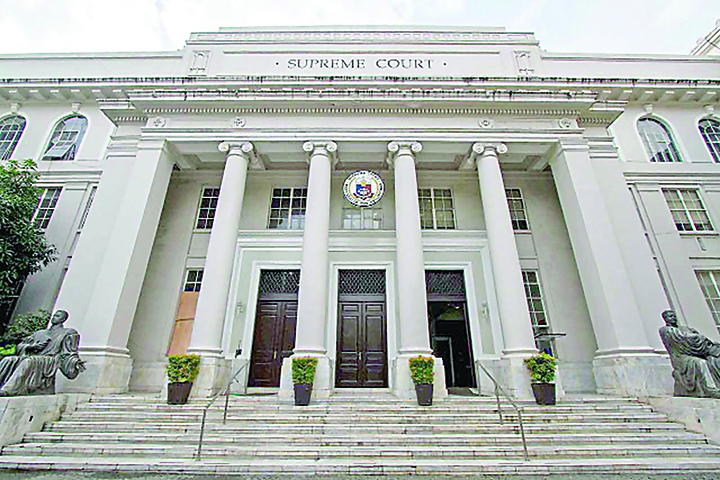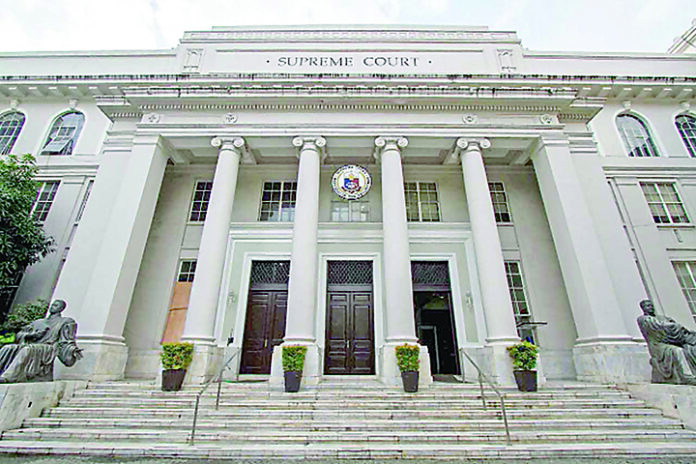
SUPREME Court Chief Justice Alexander Gesmundo on Friday said the Court will be amending its Rules of Criminal Procedure to adopt a provision on the use of body-worn cameras in the enforcement of court-issued search and arrest warrants.
During his first media interview coinciding with the SC’s 120th anniversary celebration, Gesmundo said the amended Rule would likely be finalized and implemented by July.
Associate Justice Marvic Leonen, who was assigned by the Court to study the matter, has submitted a working draft to the Court en banc on the proposed revisions.
“They are working on it and in relation to that we will be amending the Rules of Criminal Procedure with respect to those provisions and one of the things we are working on is the adoption of the rule on the use of body-worn cameras,” Gesmundo told mediamen.
He said the proposed revisions would be discussed by the Court en banc when it resumes session on June 15 considering that the justices have already submitted their respective inputs on the matter.
“I’m very optimistic, maybe after two or three deliberations we will come up with the final version,” the chief magistrate said.
“So, we hope with the issuance of these tools on body-worn cameras, these issues will be addressed. It’s in the works and by July perhaps we will have the final version and we will approve it for implementation immediately,” he added.
Pending this provision, Gesmundo reminded trial court judges to strictly adhere with the provisions of the Constitution and the Rules of Court on the issuance of search and arrest warrants.
The amendment of the Rules was approved by the Court following calls from various law groups seeking Court’s action on the series of killings allegedly perpetrated by police officers during service of warrants.
The proposal to compel law enforcers to wear body cams in the service of search warrant was aired following the death of nine activists and the arrest of several others simultaneous police and military operations conducted in the provinces of Cavite, Laguna, Batangas and Rizal on May 7 as well as several other alleged extrajudicial killings (EJK) incidents allegedly perpetrated by law enforcers.
The wearing of body cameras, according to its proponents, would prevent speculations of summary killings or EJKs against law enforcers in case a shootout happens during service of warrants and results in deaths.
This would also prevent parties from issuing false accusations or accounts of what transpired during the implementation of the warrants, according to the lawyer.
Last April 22, CJ Gesmundo led the SC in a virtual meeting with the leadership of the Philippine National Police (PNP) to discuss the issue.
Meanwhile, the Chief Justice said he has directed the Office of the Court Attorneys to conduct a research and gather materials that could guide the Court on the revisions of the Writ of Kalikasan, Writ of Habeas Data and Writ of Amparo.
“I understand the Writ of Kalikasan was adopted as early as 2010, and a number of changes have happened concerning protection of environment. We are awaiting the report of the Office of the Court of Attorneys for the materials that they’ll be gathering,” CJ Gesmundo said.
“The same with the Writ of Amparo, we are doing our continuous efforts to revise these specific rules, it’s just that we have to gather more materials to guide us for the revisions. But it is one of the priorities of the Court for revisions,” he added.
The Writ of Amparo is a remedy available to any person whose right to life, liberty and security is violated or threatened with violation by an unlawful act or omission of a public official or employee, or of a private individual or entity.
The writ covers extralegal killings and enforced disappearances or threats thereof.
The Writ of Habeas Data is a remedy available to any person whose right to privacy in life, liberty or security is violated or threatened by an unlawful act or omission of a public official or employee, or of a private individual or entity engaged in the gathering, collecting or storing of data or information regarding the person, family, home and correspondence of the aggrieved party.
On the other hand, a Writ of Kalikasan is a legal remedy law that provides protection of one’s constitutional right to a healthy environment.
Read full article on BusinessMirror

